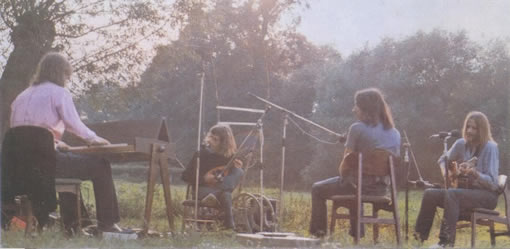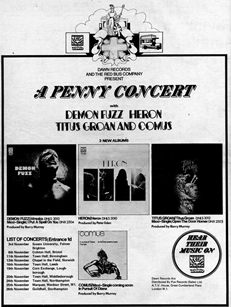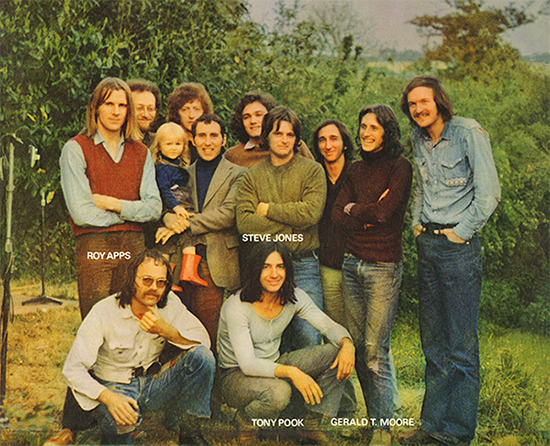About
Traffic may have been the first to establish what was to become something of a late Sixties cliché by ‘getting it together in the country’, but Berkshire folkies Heron took the rural conceit a stage further by actually recording both of their albums in a field. Both releases – their 1970 debut album Heron and the in the following year’s specially-priced double LP Twice As Nice And Half The Price – were made within the soft white underbelly of the British folk rock movement, and now warrant hefty price tags amongst collectors of the rarer artefacts of that particular genre.

Heron’s suburban genesis occurred in 1967 at the Dolphin Folk Club in Maidenhead, where Tony Pook (vocals), Roy Apps (guitar, vocals) and Robert Collins (guitar) first came together in desultory fashion as a loose-knit collective inspired by Dylan and the early Incredible String Band. By the following year, Collins was out of the picture as, with the addition of fellow local folk club habitués Gerald ‘G.T.’ Moore (guitar, mandolin, vocals) and Martin Hayward (guitar), they settled down to become Heron. Moore was a particularly interesting acquisition, having led brass-based soul band Gerald T. Moore and The Memphis Gents, local heroes to Reading mods before Moore had decamped to Maidenhead to attend art school.
With an abundance of songwriting talent in their line-up, the band began to cut rough demos of their early songs. “We started sitting around at home with an old reel-to-reel tape recorder”, recalls Roy Apps. “Then we took the tapes up to London and started knocking on doors. We were completely fearless. We just phoned people up, and said, ‘We’re coming round with a tape’, and turned up! Eventually Essex Music signed us up for publishing.”
Heron were signed to Essex by the late Gus Dudgeon, who would subsequently describe their style as “English pastoral, with a sunny, summer’s day feel… I’d been working for quite a long time with Ralph McTell, who, in the late Sixties and early Seventies, was the most successful British folk act, I suppose. Essex Music was probably the most successful publishing company as far as folk music was concerned, so inevitably a lot of folk acts would come our way in terms of getting deals and publishing and so on.” In addition to Ralph McTell, Dudgeon was also working at the time with the pre-fame likes of Elton John and David Bowie. The latter, incidentally, had a very minor cameo role in the early Heron story. “After he’d had his big hit with ‘Space Oddity’, he went quiet for a while and ran this folk club in Beckenham”, relates Roy Apps, who, as Entertainments Secretary at Reading College of Technology, was in the useful position of being able to book his own band as support act for the likes of McTell. “He saw us playing somewhere, and, out of the blue, he booked us to play at his club. It's quite a memory that David Bowie carried my PA into a folk club... once!"

Martin Hayward left the band just before they signed at the beginning of the new decade to Pye’s new ‘underground’ label Dawn. His replacement was keyboardist Steve Jones, who recalls how the band came to sign with Dawn. “We knew a local musician, blues guitarist Mike Cooper, who was doing quite well. Through him we met Peter Eden, who was Donovan’s discoverer (Eden had also produced such like-minded talents as Mick Softley and Bill Fay), and he was persuaded to listen to Heron. He really liked what he heard, and decided to do an album with us. Dawn were quite adventurous, and were going for more alternative bands such as Mungo Jerry – who, like us, didn’t use drums. Through Peter, we got onto the label.”
Jones had initially been brought in as a session musician for studio work, but he fitted in so well that he was asked to become a permanent member. Ironically, that ‘studio work’ finished almost as soon as it had begun. In July 1970, Heron recorded two songs, ‘River Of Fortune’ and ‘Some Kinda Big Thing’, at Pye Studios with the assistance of Dawn label manager Peter Eden. But despite Eden’s guidance, Heron decided that they hadn’t enjoyed the experience of recording in a studio environment. “We hated it”, admits Roy Apps. “We were so used to playing to audiences, and having something coming back and being relaxed, that the pressure of being in a recording studio – well, we just couldn’t perform.” The proposed single release was cancelled (both tracks receive their first official release on our anthology), and Heron resolved to record all future releases alfresco.
Thus it was that, in the summer of 1970, the band and their loved ones decamped to Appleford in Berkshire (coincidentally no more than three or four miles from Traffic’s own rural retreat in Aston Tirrold), staying at the farmhouse where Tony Pook’s family lived. It was out in the field at the back of the farm that, with the assistance of the Pye Mobile Unit, they recorded their self-titled debut album, full of thoughtful, gentle songs framed by the band’s raggedly charming sound. With the possible exception of the uplifting, endearingly modest trad singalong ‘Sally Goodin’ (two versions), pretty much everything had a strong sense of coherence and uniformity of mood, with the sound of birds singing in the trees adding to the album’s relaxed vibe. Amongst the highlights were a couple of Roy Apps songs, the musty, atmospheric ballad ‘Yellow Roses’ and the Bert Jansch-style ‘For You’, while Tony Pook’s majestic ‘Lord And Master’ was similarly full of wistful, sun-dappled harmonies and meshing acoustic guitars and keyboards. However, the band’s ability to merge English rural idyll and blissed-out counterculture sentiments perhaps peaked with ‘Upon Reflection’, an Apps song crammed with such evocative lines as “sitting in your mother’s garden smoking Lebanese beneath the privet hedge”. Sadly there was no room for the beautiful ‘Rosalind’, which now makes its first public appearance – as does the complete version of ‘Harlequin 2’, which shed its final two minutes when released. Given the extraneous background noise, it’s tempting to suggest that the song was truncated on release for that reason – but apparently not, as Steve Jones explains. “We set up a separate microphone a hundred yards or so from where the band was playing to deliberately pick up the sounds of nature. Eventually, in fact, we had to ‘dirty up’ the sound because the background noise was cleaner than we wanted it. But ‘Harlequin 2’ was cut short on record for the simple fact that we played it wrong, and the track just fell apart towards the end!”
Released in November 1970, the album was a genuine achievement, but sadly failed to make any real impact - despite the band’s concurrent appearance on the infamous, loss-leading Dawn Penny Concerts tour, which featured a quartet of Dawn bands for an admission price of one pre-decimal penny. “Wherever we went, we had good turnouts for the Penny Concert tour”, reflects Steve Jones. “The reception to the various bands differed from venue to venue – we got a standing ovation in Bristol, for example, whereas it was Titus Groan who went down well in Birmingham. But we were a quiet band, and we felt more comfortable when we played more intimate gigs.”
 “My main recollection of the Penny Concert tour”, adds Roy Apps, “is the incredible reception we got for the gig at the Colston Hall in Bristol, with three thousand people standing on the seats – it took me hours to work off the adrenalin. But I also remember the endless waits we had to put up with in the Red Bus offices trying to collect our expenses, and also the ‘barging’ incident! All the bands on the tour were intent on being the last on – that inferred ‘top of the bill’ status – but we couldn’t care less. We suggested that all the bands simply took it in turn. So after one of the managements had been particularly irritating, I ‘accidentally’ barged into him as he entered the dressing room and quipped the classically hippie apology – ‘Sorry man…’ By the time we were back in London, the brushing of shoulders had become ‘Roy beat up the band manager’!”
“My main recollection of the Penny Concert tour”, adds Roy Apps, “is the incredible reception we got for the gig at the Colston Hall in Bristol, with three thousand people standing on the seats – it took me hours to work off the adrenalin. But I also remember the endless waits we had to put up with in the Red Bus offices trying to collect our expenses, and also the ‘barging’ incident! All the bands on the tour were intent on being the last on – that inferred ‘top of the bill’ status – but we couldn’t care less. We suggested that all the bands simply took it in turn. So after one of the managements had been particularly irritating, I ‘accidentally’ barged into him as he entered the dressing room and quipped the classically hippie apology – ‘Sorry man…’ By the time we were back in London, the brushing of shoulders had become ‘Roy beat up the band manager’!”
Despite their Radio One session debut in January 1971 as part of John Peel’s Sunday Concert, sales of the Heron album failed to pick up. What was needed to break the band, it seemed, was a hit single. It almost happened. Released in April, the maxi-single featured four tracks (a fifth song, ‘Friend’, was recorded but omitted at the last minute – sadly this track no longer survives in the Pye/Dawn archives) including a suitably bucolic take on Dylan’s ‘Only A Hobo’ and, as lead track, a hook-laden G.T. Moore song entitled ‘Bye And Bye’. With the normally influential Tony Blackburn making it his Record of the Week, ‘Bye And Bye’ received copious Radio One airplay, as Steve Jones recalls. “Everyone was playing it – Tony Blackburn, John Peel, Radio Luxembourg’s Kid Jensen… suddenly it was all happening! And we sat back, just waiting to be millionaires. Instead of which, you just couldn’t buy the single. Apparently there’d been a vinyl problem initially, so they only pressed one or two thousand copies. Then there was a strike of delivery van drivers, so you just couldn’t get the single. From being on a high, suddenly we plummeted. It took a lot of steam out of us.”
Despite this disappointment, Heron carried on. After being invited by David Bowie to appear as his support band at a June 1971 concert for Radio One, they hatched plans to record a second album. Tony Pook: “The engineer on our first album knew some people in Devon who rented out cottages, and he arranged for us to do the album down there – so we all piled into the vehicles with our massive £250 advance from Pye Records!” The band booked a week at West Emlett Cottage, a gamekeeper’s cottage in a small wood situated to the south of the village of Black Dog, and once again recorded out in the gardens. This time, though, their sound was fleshed out slightly at times by the presence of auxiliary members Mike Finesilver (bass), Terry Gittings (drums), Bill Boazman (electric guitar) and their old friend and fellow Dawn artist Mike Cooper (slide guitar), who also took the front cover photo (Heron had recently appeared as backing vocalists on Cooper’s album Trout Steel, by the way). With G.T. Moore in particularly prolific form, this time Heron came up with enough material to fill a double album, and such wise, gentle songs as Tony Pook’s ‘Wanderer’ and Moore’s lovely ‘Winter Harlequin’ made Twice As Nice And Half The Price a rewarding if rather sprawling 2LP set, full of understated harmonies and a rootsy, organic instrumental mix that, on tracks like ‘John Brown’ (an early, unreleased Dylan song kitted out with a new melody) and the punchy ‘Big A’, were occasionally reminiscent of the Band.

But the combination of enjoyable but essentially lightweight cover versions of ‘This Old Heart Of Mine’ and ‘You’ve Really Got A Hold On Me’ (which, like Woody Guthrie’s ‘The Great Dust Storm’, had been staples in G.T. Moore’s pre-Heron, R&B/soul repertoire) and a sprinkling of sub-standard originals like the deliberately charmless ‘Getting ‘Em Down’ (“We recorded it that way as a bit of a joke”, admits Steve Jones. “There was always a strong sense of humour in the band.”) has led Heron to belatedly conclude that the release of a two-LP package was a mistake. “We spent two fabulous weeks just doing what we wanted to do - hanging out, singing and playing”, recalls Tony Pook. “We released Twice As Nice And Half The Price as a double album, but we shouldn’t have done so. I think that there was enough material there for one very good album, but one quite mediocre double album. But we wanted two records for the price of one. That was the hippie ethos behind it, for people to get value for money – which I think they did.”
Twice As Nice And Half The Price was released in October 1971 but failed to pull up any trees (probably not the most appropriate expression to use about such an environmentally-aware group of musicians). A concurrent single, the understated ‘Take Me Back Home’ (b/w ‘Minstrel And A King’), fared no better in sales terms – in retrospect, perhaps the album’s most commercial offering, the catchy ‘My Turn To Cry’, would have been a better choice. As it turned out, ‘Take Me Back Home’ and Twice As Nice And Half The Price were to prove Heron’s final releases for the Dawn label, with a belated return to the hated Pye Studios in August 1972 (the hitherto-unissued track that was recorded during this session, ‘If It’s Love’, suggests a far more rock-oriented band) proving to be abortive. Tensions within the band then led to the departure of G.T. Moore, with Roy Apps now giving the band’s side of the story. “It became very difficult to work with him. There was one gig – quite a big gig, actually, paying us what was quite a lot of money at the time – at which he turned up with a pennywhistle. And he was our lead guitarist! Normally he played mandolin, guitar and everything else, but he decided in his wisdom that he was going to do this particular gig on a pennywhistle. We were a folk act, but he really wanted a rock band at the time, then after that he wanted a reggae band, then he wanted all three. And eventually, when it became obvious that the record company weren’t going to be behind us, we sort of drifted apart, I suppose.”
After Heron played their third and final Radio One session in August 1972 (on the Bob Harris-fronted Sounds of the Seventies), the band imploded. Moore issued a solo single through Jonathan King’s UK label in October 1972 before signing to the Charisma label as G.T. Moore and The Reggae Guitars (who also featured his friend and erstwhile Heron colleague Martin Hayward), also backing Persian singer Shusha on her mid-Seventies albums for UA. Meanwhile, Heron’s name continued to be used for sundry post-Moore ventures, including a late Seventies/early Eighties version of the band with Terry Clarke, who subsequently left to pursue a solo career. Various low-key recordings were made in the undertow of an increased level of interest in the band on the burgeoning Rare Record market. The culmination of three decades of sporadic activity occurred in 1997 when, with Gerry Power replacing the long-lost Moore, Heron returned to Black Dog for a reunion album that was quickly followed by a video/DVD charting the band’s myriad adventures. At the end of the week they gave a farewell concert to the Black Dog villagers, just as they had done some twenty-six summers earlier… Later in 2011 the original line-up got back together to record a new album and to do a couple of gigs in the UK. Their new album 'Simple As One Two Three' was released in Japan in August 2011 and is now also digitally available. Later in 2013 they also releasing a Dylan cover album called 'Jokerman - Songs of Bob Bylan'.
Currently doing gigs in both UK and Europe.
With excerpts of :
DAVID WELLS 2005 (Upon Reflection Album notes)
